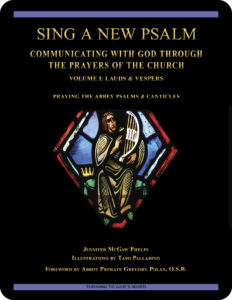 Sing a New Psalm:
Sing a New Psalm:
Communicating with God Through
the Prayers of the Church
Volume I: Lauds & Vespers
Lesson 19 For the Peace of Jerusalem Pray
Psalm 122, Psalm 125, Psalm 126, and Psalm 127
Monday Vespers (Week II)
Revised Standard Version Catholic Edition (RSVCE)*
New American Bible Revised Edition (NABRE)*
Catechism of the Catholic Church
ex libris (in our library)
next lesson: The LORD God Is a Sun & a Shield
This material coordinates with Lesson 19 on pages 78–81 in Sing a New Psalm: Communicating with God Through the Prayers of the Church—Volume I: Lauds & Vespers. Our Catholic Bible study is based on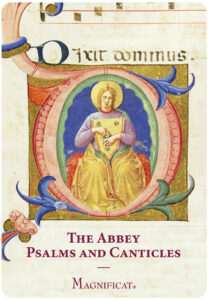 The Abbey Psalms and Canticles, an English translation of the Psalms prepared by the monks at Conception Abbey in 2010 and first published as The Revised Grail Psalms. The Abbey Psalms and Canticles is a revision of that work, finished in 2020 and published by the United States Conference of Catholic Bishops (USCCB). Wording and numbering of some Psalms and verses in other translations may differ. This new translation of the Psalms in the process of being added to all English-language Liturgy of the Hours books used in the United States. The USCCB also plans a liturgical Bible based on the NABRE translation.
The Abbey Psalms and Canticles, an English translation of the Psalms prepared by the monks at Conception Abbey in 2010 and first published as The Revised Grail Psalms. The Abbey Psalms and Canticles is a revision of that work, finished in 2020 and published by the United States Conference of Catholic Bishops (USCCB). Wording and numbering of some Psalms and verses in other translations may differ. This new translation of the Psalms in the process of being added to all English-language Liturgy of the Hours books used in the United States. The USCCB also plans a liturgical Bible based on the NABRE translation.
“Unlike other prayers in sacred Scripture, the prayers contained in the Psalms are not inserted into a narrative story that specifies their meaning and function. Instead, the Psalms are given to the believer precisely as a text of prayer. Since they are the Word of God, the believer who prays the Psalms speaks to God using the very words that God himself has given to us. Thus, in praying the Psalms we learn to pray. The Psalms are a school of prayer.”—Pope Benedict XVI
welcome to our in-depth study of the Psalms
We invite groups and individuals to check out the sample first lesson from this 28- lesson Turning to
lesson Turning to  God’s Word Catholic Bible study. Our online study pages include additional questions, commentary, and prayers based on the Psalm texts. Sing a New Psalm: Communicating with God Through the Prayers of the Church—Volume I: Lauds & Vespers has been granted an imprimatur. A digital version of this study can be purchased from our website shop. Volume II: Vigils, Day Prayer & Compline is scheduled for publication in 2025. If you have a Bible-related question or comment, click on one of the “ask us your question” or “what do you think” buttons on any online study page.
God’s Word Catholic Bible study. Our online study pages include additional questions, commentary, and prayers based on the Psalm texts. Sing a New Psalm: Communicating with God Through the Prayers of the Church—Volume I: Lauds & Vespers has been granted an imprimatur. A digital version of this study can be purchased from our website shop. Volume II: Vigils, Day Prayer & Compline is scheduled for publication in 2025. If you have a Bible-related question or comment, click on one of the “ask us your question” or “what do you think” buttons on any online study page.
open with prayer
It’s always wise to begin any Bible study with prayer, whether reading the Scriptures alone or meeting with others in a discussion study group. You can pray using your own words, pray one of the Psalms in this lesson, or use one of the opening prayers on our website. We especially like the following:
Lord Jesus, you promised to send your Holy Spirit
to teach us all things.
As we read and study your word today,
allow it to touch our hearts and change our lives. Amen.
pray for peace in God’s holy city of Jerusalem—& throughout the world
This illustration by Turning to God’s Word co-founder Tami Palladino captures the theme of Lesson 19  —”For the Peace of Jerusalem Pray.” The Holy City is shown in deepening shadows at sunset, the time of day when Vespers are prayed. Jerusalem’s darkened skyline stands out in bold relief against the glowing evening sky. There’s little doubt that Jerusalem today is a dangerous place. In this city sacred to Jews, Christians, and Muslims, strong religious feelings lead to hostilities. It’s fitting for Christians to pray for an end to violence, especially violence associated with threats to religious freedom. As we pray for peace in the Holy Land, let’s also pray to do our part to bring about more peace in our own lives. Click on Tami’s illustration (right) to enlarge it. Her original illustration is on page 79 in Sing a New Psalm: Communicating with God Through the Prayers of the Church—Volume I: Lauds & Vespers.
—”For the Peace of Jerusalem Pray.” The Holy City is shown in deepening shadows at sunset, the time of day when Vespers are prayed. Jerusalem’s darkened skyline stands out in bold relief against the glowing evening sky. There’s little doubt that Jerusalem today is a dangerous place. In this city sacred to Jews, Christians, and Muslims, strong religious feelings lead to hostilities. It’s fitting for Christians to pray for an end to violence, especially violence associated with threats to religious freedom. As we pray for peace in the Holy Land, let’s also pray to do our part to bring about more peace in our own lives. Click on Tami’s illustration (right) to enlarge it. Her original illustration is on page 79 in Sing a New Psalm: Communicating with God Through the Prayers of the Church—Volume I: Lauds & Vespers.
 daily needs—you could look it up in our archives
daily needs—you could look it up in our archives
It’s not uncommon—nor entirely wrong—for people to think about praying as bartering with God. To learn about praying for our “daily needs”—and what those needs might be, read Lost in Translation, an online column in which Turning to God’s Word author Matthew Phelps helps readers connect with ideas expressed in the original languages of the Scriptures. New Lost in Translation entries are posted on Mondays, and past entries are archived on our website. Contact us if you’d like to receive Lost in Translation by email every week.
ex libris—information about our daily needs
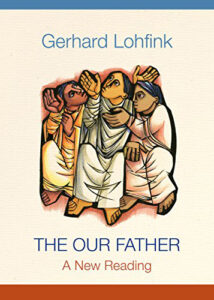 While the Our Father is recited at every celebration of Mass—with the assembly praying in unison, not many Catholics give much thought to what their daily needs
While the Our Father is recited at every celebration of Mass—with the assembly praying in unison, not many Catholics give much thought to what their daily needs  actually entail. The language—even if we substitute “your name” for “thy name”—can seem cumbersome, old-fashioned, and formulaic. For people who want to think more about exactly what we’re petitioning God to do, we recommend Gerhard Lohfink’s excellent book, The Our Father: A New Reading. Lohfink, a German theologian, has written a short and extremely readable in-depth explanation of the prayer many Christians have come to take for granted. Read excerpts and learn more about The Our Father: A New Reading and other works related to Bible study at ex libris—main bookshelf.
actually entail. The language—even if we substitute “your name” for “thy name”—can seem cumbersome, old-fashioned, and formulaic. For people who want to think more about exactly what we’re petitioning God to do, we recommend Gerhard Lohfink’s excellent book, The Our Father: A New Reading. Lohfink, a German theologian, has written a short and extremely readable in-depth explanation of the prayer many Christians have come to take for granted. Read excerpts and learn more about The Our Father: A New Reading and other works related to Bible study at ex libris—main bookshelf.
the popes inspire us—Jerusalem means a vision & peace
 “Peace of Christ” on page 79 in Sing a New Psalm: Communicating with God Through the Prayers of the Church—Volume I: Lauds & Vespers is an excerpt from an audience with Pope Benedict XVI. The Holy Father examines peace as it’s understood by St. Augustine of Hippo. “We are the Israel of God, and let us cling tightly to peace, for Jerusalem means a vision and peace, and we are Israel: The Israel on which is peace.” For Pope Benedict XVI, the only earthly peace possible is the peace of Christ. It isn’t necessary that a person be a beauty contestant in order to long for world peace. Consider the following questions:
“Peace of Christ” on page 79 in Sing a New Psalm: Communicating with God Through the Prayers of the Church—Volume I: Lauds & Vespers is an excerpt from an audience with Pope Benedict XVI. The Holy Father examines peace as it’s understood by St. Augustine of Hippo. “We are the Israel of God, and let us cling tightly to peace, for Jerusalem means a vision and peace, and we are Israel: The Israel on which is peace.” For Pope Benedict XVI, the only earthly peace possible is the peace of Christ. It isn’t necessary that a person be a beauty contestant in order to long for world peace. Consider the following questions:
 ? What are some of the ways in which you see Christ’s peace at work in your own life?
? What are some of the ways in which you see Christ’s peace at work in your own life?
? How does Christ’s peace differ from the peace offered by the secular world?
? Who is the most peace-loving person that you know?
? What can you do to advance peace among the people with whom you come in contact daily?
ex libris—all about the city that’s spiritual home to three world religions
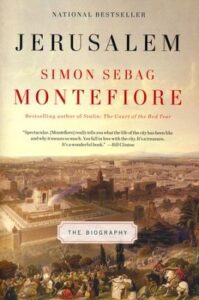 The title Jerusalem: The Biography says it all. Simon Sebag Montefiore’s prize-winning work of non-fiction looks at the Holy City’s 3,000 years of
The title Jerusalem: The Biography says it all. Simon Sebag Montefiore’s prize-winning work of non-fiction looks at the Holy City’s 3,000 years of  frequently unholy history through the viewpoint of Jews, Christians, and Muslims. A seriously ambitious work, this lengthy book treats the city of David as the primary character in a gripping narrative of the location often referred to as the “center of the world.” Jerusalem: The Biography opens by recounting the Roman attack on the city in 70 A.D., followed by an intensive look at Jewish control of Jerusalem beginning with David’s conquest of the citadel of Zion. Sections on the Christian and Muslim influences on the Holy City follow. Present-day political leaders see Jerusalem as key to peace in the Middle East. Visit ex libris—main bookshelf, to read an excerpt from this book and others related to in-depth Scripture study.
frequently unholy history through the viewpoint of Jews, Christians, and Muslims. A seriously ambitious work, this lengthy book treats the city of David as the primary character in a gripping narrative of the location often referred to as the “center of the world.” Jerusalem: The Biography opens by recounting the Roman attack on the city in 70 A.D., followed by an intensive look at Jewish control of Jerusalem beginning with David’s conquest of the citadel of Zion. Sections on the Christian and Muslim influences on the Holy City follow. Present-day political leaders see Jerusalem as key to peace in the Middle East. Visit ex libris—main bookshelf, to read an excerpt from this book and others related to in-depth Scripture study.
read the Catechism—particular judgment can be confusing
Many people have difficulty understanding how particular judgment differs from Final Judgment. Paragraphs 1021 and 1022 in the Catechism of the Catholic Church explain Church teaching.
 1021 Death puts an end to human life as the time open to either accepting or rejecting the divine grace manifested in Christ. The New Testament speaks of judgment primarily in its aspect of the final encounter with Christ in his second coming, but also repeatedly affirms that each will be rewarded immediately after death in accordance with his works and faith. The parable of the poor man Lazarus and the words of Christ on the cross to the good thief, as well as other New Testament texts, speak of a final destiny of the soul—a destiny which can be different for some than for others.
1021 Death puts an end to human life as the time open to either accepting or rejecting the divine grace manifested in Christ. The New Testament speaks of judgment primarily in its aspect of the final encounter with Christ in his second coming, but also repeatedly affirms that each will be rewarded immediately after death in accordance with his works and faith. The parable of the poor man Lazarus and the words of Christ on the cross to the good thief, as well as other New Testament texts, speak of a final destiny of the soul—a destiny which can be different for some than for others.
1022 Each man receives his eternal retribution in his immortal soul at the very moment of his death, in a particular judgment that refers his life to Christ: either entrance into the blessedness of heaven—through a purification or immediately,—or immediate and everlasting damnation.
At the evening of life, we shall be judged on our love.
a variation in verse numbers
Occasionally there’s a difference in the way that the Revised Standard Version Second Catholic Edition (RSV2CE) and the New American Bible Revised Edition (NABRE) translations number particular passages. Turning to God’s Word Bible studies use the RSV2CE unless otherwise noted. (The printed version of this Psalms study, for example, is based on The Abbey Psalms and Canticles.) Because differences in verse numbers can confuse participants looking up citations in the NABRE, we attempt to identify such differences in the lessons and the index. Unfortunately, the citation in Question 4 for this lesson slipped past us. Future editions will note that the Book of Zechariah 2:3–5 (RSV2CE) corresponds to the Book of Zechariah 2:7–9 (NABRE). Any passage in the two translations always can be compared by using the links to the RSVCE and the NABRE at the top of every online study page. Learn more by reading the related Q&A for Lesson 1 Set a Guard on My Mouth and checking out Bible translations.
a clarification in the study book
Despite our best efforts reading our Bible studies before publication, occasionally something confusing sneaks past us. Question 2 in Sing a New Psalm: Communicating with God Through the Prayers of the Church—Volume I: Lauds & Vespers has been rewritten for clarity to now read:
Question 2 Read Psalm 122:4–5. Who is going up to Jerusalem? How are they related to each other? What are the tribes of the LORD tasked with doing? Read the Second Book of Samuel 7:12–13. What promise did God make concerning the throne of the house of David? Refer to paragraphs 1021–1022 in the Catechism of the Catholic Church to explain the Christian understanding about particular judgment.
the best Catholic commentary about Scripture
 To find out more about how Church teaching is supported by passages in Sing a New Psalm: Communicating with God Through the Prayers of the Church—Volume I: Lauds & Vespers, check out the Index of Citations in the Catechism of the Catholic Church. Links to the primary Scripture passages in the lesson (Revised Standard Version Catholic Edition [RSVCE*]) and relevant paragraphs in the Catechism are provided here. Not every passage in the biblical text for this study is referenced in a Catechism paragraph, however, including Psalm 122, Psalm 125, Psalm 126, and Psalm 127 in this lesson.
To find out more about how Church teaching is supported by passages in Sing a New Psalm: Communicating with God Through the Prayers of the Church—Volume I: Lauds & Vespers, check out the Index of Citations in the Catechism of the Catholic Church. Links to the primary Scripture passages in the lesson (Revised Standard Version Catholic Edition [RSVCE*]) and relevant paragraphs in the Catechism are provided here. Not every passage in the biblical text for this study is referenced in a Catechism paragraph, however, including Psalm 122, Psalm 125, Psalm 126, and Psalm 127 in this lesson.
don’t forget about our indexes & extra online material

 If you’re trying to locate information about a specific Scripture passage, you can look it up in the index at the back of the study book or sample lesson. If you want to find a particular commentary, you can look up its title in the topics index. To learn more about another book of the Bible for which there’s a Turning to God’s Word study, visit the online study directories to read the commentaries and watch any accompanying videos. Finally, if you have a question or would like to make a comment about any of our studies, you can use one of the “ask us your question” or “what do you think” buttons to email our authors.
If you’re trying to locate information about a specific Scripture passage, you can look it up in the index at the back of the study book or sample lesson. If you want to find a particular commentary, you can look up its title in the topics index. To learn more about another book of the Bible for which there’s a Turning to God’s Word study, visit the online study directories to read the commentaries and watch any accompanying videos. Finally, if you have a question or would like to make a comment about any of our studies, you can use one of the “ask us your question” or “what do you think” buttons to email our authors.
ex libris—Church documents & books about religious topics
Link to magisterial documents referred to in our Bible studies at ex libris—magisterial documents.  This listing includes significant recent encyclicals as well as a number of historical Church documents. Recommended books related to Scripture study can be found at ex libris—main bookshelf.
This listing includes significant recent encyclicals as well as a number of historical Church documents. Recommended books related to Scripture study can be found at ex libris—main bookshelf.
wondering how to pronounce some of these words?
The following links are to readings from the New International Version (NIV) Bible. To listen, open one of the links and click on the audio icon above the printed text. Although not taken from the translations used in our study materials, the NIV readings provide an audio guide to pronunciation of words in this lesson’s primary biblical texts. A close online version of the translation of the Bible used in Catholic liturgy in the United States as well as an audio guide for daily Mass readings for the current month can be found on the website of the United States Conference of Catholic Bishops (USCCB).
Psalm 122 (NIV)
Psalm 125 (NIV)
Psalm 126 (NIV)
Psalm 127 (NIV)
 close with a Psalms-based prayer for Monday Vespers (Week II)
close with a Psalms-based prayer for Monday Vespers (Week II)
Many of our Catholic study groups like to conclude their discussions with a prayer based on the scriptural focus of their lesson. If you’re uncomfortable composing your own Bible-based prayers, you can follow our four easy steps. If you prefer, you can pray any of the Psalms in this lesson, or you can use the following short prayer.
O God, you desire peace to spread over all nations of the world.
Keep us mindful of those in distant places
who are suffering the violence and unrest
associated with war and other hostilities.
Help us to be dutiful in remembering to pray for their welfare,
and show us ways in which we can promote peace in our own lives.
We ask this in the name of your Son, Jesus Christ,
who’s known as the Prince of Peace. Amen.
Lesson 20 The LORD God Is a Sun & a Shield, Tuesday Lauds (Week II)—Psalm 84, Psalm 85, and Psalm 97
Lesson 18 What God Is As Great As Our God? Monday Lauds (Week II)—Psalm 77, Psalm 87, and Psalm 96
you also may like our study of the book of Revelation
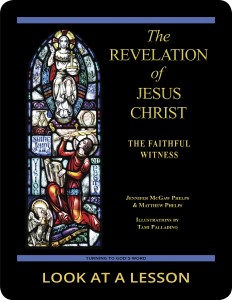 The Revelation of Jesus Christ: The Faithful Witness, a 23-lesson Catholic Bible study with an imprimatur, examines ways in which our traditional Christian view of heaven is built on Hebrew apocalyptic visions recorded in the Old Testament. This recently revised study includes maps and additional commentary and takes a close look at the role of the prophets in present-day Christianity. Illustrations by Tami Palladino depict the often-misunderstood images in the book of Revelation. Click on the book’s cover to view a sample lesson.
The Revelation of Jesus Christ: The Faithful Witness, a 23-lesson Catholic Bible study with an imprimatur, examines ways in which our traditional Christian view of heaven is built on Hebrew apocalyptic visions recorded in the Old Testament. This recently revised study includes maps and additional commentary and takes a close look at the role of the prophets in present-day Christianity. Illustrations by Tami Palladino depict the often-misunderstood images in the book of Revelation. Click on the book’s cover to view a sample lesson.
start a Turning to God’s Word Bible study
Thank you for your interest in Sing a New Psalm: Communicating with God Through the Prayers of the Church—Volume I: Lauds & Vespers. 
 More information about beginning a Turning to God’s Word Bible study can be found on this website at start a Bible study, and Tami, Matthew, and I are available to answer questions or discuss concerns. Contact us to start this or one of our other studies or to have your schedule listed with other TtGW study groups on our website. —Jennifer
More information about beginning a Turning to God’s Word Bible study can be found on this website at start a Bible study, and Tami, Matthew, and I are available to answer questions or discuss concerns. Contact us to start this or one of our other studies or to have your schedule listed with other TtGW study groups on our website. —Jennifer
*There are seven deuterocanonical books in the Old Testament—the Books of Tobit, Judith, Wisdom, Sirach, Baruch, and First and Second Maccabees, as well as some passages in the Books of Esther and Daniel. Protestants usually refer to these works as “apocryphal,” a word that means “outside the (Protestant) canon” because they’re excluded from most Protestant Bibles. The word “deuterocanonical” means “second canon”; Catholics use that word to refer to any section of the Catholic Old Testament for which there are no extant, or existing, Hebrew manuscripts. All of the deuterocanonical books appear in the Septuagint, the earliest remaining versions of which date to the 1st century B.C. This Greek translation of the Old Testament was in common use by Jews at the time of Jesus. Learn more by reading How Do Catholic & Protestant Bibles Differ?
Turning to God’s Word printed Bible studies use the 2006 Revised Standard Version Second Catholic Edition (RSV2CE) translation for all Scripture references except the Psalms, which are taken from The Abbey Psalms and Canticles, prepared by the monks of Conception Abbey and published in 2020 by the United States Conference of Catholic Bishops (USCCB). All Scripture links for the online study pages for Sing a New Psalm: Communicating with God Through the Prayers of the Church—Volume I: Lauds & Vespers are to the 1966 Revised Standard Version Catholic Edition (RSVCE) translation. The New International Version (NIV) audio recordings follow the same chapter and verse numbering as the RSV Catholic translations, but the NIV doesn’t include the deuterocanonical passages.
The 1966 RSVCE uses archaic pronouns and verb forms such as “thee,” “thou,” “didst” in the Psalms and in direct quotations attributed to God. The 2006 RSV2CE replaces these with more accessible English. The few significant translation changes in the RSV2CE include rendering almah as “virgin” in the Book of Isaiah 7:14 and restoring the term “begotten” in the Gospel According to John 3:16.
The Psalms in this Bible study reflect numbering used in The Abbey Psalms and Canticles; Psalms numbering may vary in other translations. Numbering also may vary for a few other passages in this Bible study. Turning to God’s Word studies follow the numbering in the Revised Standard Version Catholic translations (RSVCE and RSV2CE). Discrepancies in the New American Bible Revised Edition (NABRE) are noted in the Index of Scripture Citations in the study book and the online sample.
 The companion to this Catholic Bible study from Turning to God’s Word, Sing a New Psalm: Communicating with God Through the Prayers of the Church—Volume II: Vigils, Day Prayer & Compline, will cover Psalms not included in Volume I: Lauds & Vespers. Volume II: Vigils, Day Prayer & Compline is scheduled for publication in 2025.
The companion to this Catholic Bible study from Turning to God’s Word, Sing a New Psalm: Communicating with God Through the Prayers of the Church—Volume II: Vigils, Day Prayer & Compline, will cover Psalms not included in Volume I: Lauds & Vespers. Volume II: Vigils, Day Prayer & Compline is scheduled for publication in 2025.
